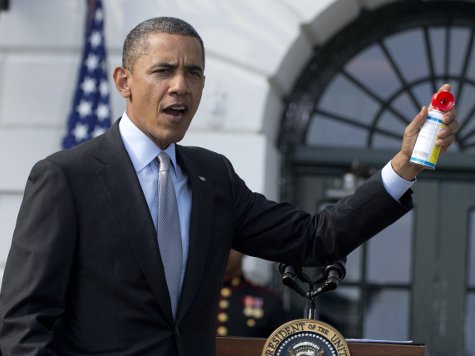President Barack Obama will use the the five-year anniversary of the collapse of Lehman Brothers–and the ensuing financial crisis–today to attempt yet another “pivot” to economic issues for what is, conservatively, the dozenth time. Amid the boilerplate remembrances of jobs lost, homes foreclosed, dreams on hold (they still are, for millions), Obama will be not-so-quietly celebrating the event that brought him to power.
Prior to Wall Street’s implosion, Obama had been losing to Sen. John McCain (R-AZ) in the polls. But the collapse was the crisis he had been waiting for, and which he would continue to exploit in the early years of his presidency. It was also, to paraphrase a campaign slogan, the change he had been waiting for, the failure of free-market capitalism the left had long predicted and for which many had fervently, and openly, hoped.
The left has two basic stories about the financial crisis. One tries, at least, to follow policy cause with economic effect by blaming Wall Street deregulation–especially the repeal of the Glass-Steagall Act in 1999, which had restricted commercial banks’ involvement in investment banking. (The role of President Bill Clinton in that deregulation is often downplayed.) But while adding to banks’ exposure, that was not the primary cause.
The other narrative is that greed in general was to blame–greed facilitated by the tax cuts passed under President George W. Bush, which put too much money in the hands of the greediest people. That money needed to go somewhere, and so it went into speculative investment. This explanation, which is believed by an alarming number of otherwise bright people, suggests an answer in higher taxes and bigger government.
In fact, big government is largely to blame for the financial crisis, through policies that forced banks to lend to people who could not afford to repay the loans, under the guise of correcting racial discrimination in the housing market. Those policies were rooted in the Community Reinvestment Act, passed under President Jimmy Carter, renewed by Clinton, and enthusiastically pushed by Barack Obama as a young attorney.
Like many regulations, those that forced subprime lending were initially resisted, then embraced by the big players, who decided to find a way to make money once it was clear that the regulatory problem was never going to go away. Their method was to securitize mortgages, bundling bad loans together with good ones, like a roll of $1 bills inside a few crisp $20 notes, a government-guaranteed way to cash in on the poor.
When critics, including the regulator in charge of overseeing Fannie Mae and Freddie Mac, tried to rein in the problem, they were blocked at every stage by the Democrats on their payroll–including, near the top of campaign cash recipients, Sen. Barack Obama. Even after the collapse, people like House Financial Services Committee Chairman Barney Frank were arguing for an increased federal role in new housing loans.
That changed once Frank faced a real political challenge in the sudden, Tea Party campaign of Sean Bielat. Facing possible defeat in a seat he had held for decades, Frank recanted his previous support for Fannie and Freddie and said that he, too, believed the two government-sponsored entities should be shuttered. That pre-Election Day conversion came in time to save Frank’s seat but not the terrible cost of his policies.
Today, government is more entwined in the financial and housing markets–among others–than ever before. Obama will point to the fact that controversial Wall Street and auto industry bailouts restored parts of their respective industries to health (and will, as usual, take credit for parts that did not take taxpayer assistance, like Ford). But what Bush saw as a temporary intervention, Obama clearly sees as permanent involvement.
The result is a European-style economy–slow growth, persistent high unemployment, lower labor force participation, an explosion of welfare programs, and exhortations about inequality. That is what Obama and most Democrats had wanted, and what the Lehman collapse delivered. They were enabled by conservatives who failed to rally to the free market at the critical moment. America still suffers for that lack of leadership.

COMMENTS
Please let us know if you're having issues with commenting.